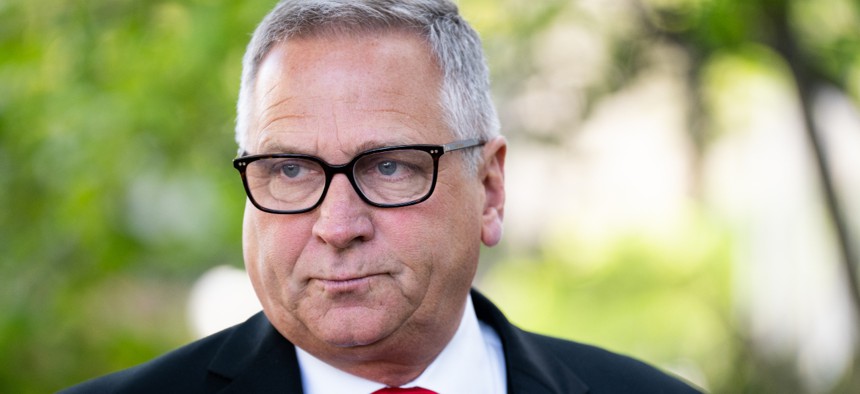
Rep. Mike Bost, R-Ill., the ranking member on the House Committee on Veterans’ Affairs, told department officials on Wednesday that their reliance on mandatory overtime was “not a long-term solution.” Bill Clark/CQ-Roll Call, Inc via Getty Images
Officials Seek to Reassure Lawmakers Skeptical VA Can Staff Up to Meet New Obligations
VA will soon provide new care and benefits to millions and lawmakers have concerns about its capacity.
The Veterans Affairs Department is making significant strides in implementing a new law that could soon bring millions of new patients and beneficiaries into the fold, officials told lawmakers at a hearing on Wednesday as they sought to assuage concerns that the agency is ill-prepared for the forthcoming deluge of new responsibilities.
Much of the pushback from VA brass stemmed from progress the department has made in hiring more employees, with witnesses before the House VA Committee praising new authorities and flexibilities that Congress has provided. The hearing concerned the Honoring Our Promise to Address Comprehensive Toxics (PACT) Act, which President Biden signed into law earlier this year to newly presume, for the purposes of eligibility for care and benefits from the VA, that 23 respiratory illnesses contracted by veterans are related to burn pits used in the military.
VA has already screened more than 500,000 veterans for burn pit-related illnesses, with 37% of those reporting exposures. Veterans have submitted 177,000 claims to the Veterans Benefits Administration related to the PACT Act, which VA will begin processing in January.
“I’m worried VA is already behind the curve,” said Rep. Mike Bost, R-Ill., the top Republican on the committee. The ranking member added that despite new hires to handle the workload—the measure is expected to provide new benefits and care to more than 3 million veterans—still need time to get trained and VA’s reliance on mandatory overtime was “not a long-term solution.”
Shereef Elnahal, VA’s undersecretary for health, said the Veterans Health Administration has brought on more than 12,000 employees as part of a recent hiring surge to prepare for the law’s implementation, and hired 3,600 new staff for health care enrollment positions to determine veterans’ PACT Act eligibility. Joshua Jacobs, the current undersecretary for benefits at VA, said VBA has been conducting hiring efforts "up and down the organization." He noted VA has already added 2,000 new benefits processors in anticipation of the PACT Act workload, is one-third of its way to meeting its goal of hiring 1,900 employees within six months of the law's enactment and plans to then hire 2,500 more personnel. He explained that VA is currently maxed out at 4,400 hires per year due to the available slots in training classes, but said the department is working to increase that capacity.
Lawmakers repeatedly peppered the officials with additional questions about its readiness to take on new workloads and the necessary staff to complete it. Rep. Barry Moore, R-Ala., asked if VA had a backup plan to ensure a smooth PACT Act implementation if it falls short of its hiring targets. Jacobs responded that VA must actively hire and boasted of efforts to build training efforts and to recruit military spouses and service members transitioning into civilian life. Rep. Nancy Mace, R-S.C., asked how VA can retain its current employees and attract new ones given the high cost of living in areas like her home district, while Rep. Chip Roy, R-Texas, raised concerns that veterans already wait too long to receive care at VA.
“What are we going to do now to guarantee access to care when we’re going to have a 55% increase in people, potentially, able to walk through the door?” Roy asked.
Elnahal said VA is taking steps to standardize how long doctors spend with patients and continuing to streamline its partnerships with private sector providers. He stressed that his top concern when he goes to bed at night and when he wakes up in the morning, however, is ensuring VA can hire enough people.
Tracey Therit, VA’s chief human capital officer, highlighted the new authorities included in the PACT Act to ease recruiting and retention efforts.
VA has successfully removed restrictions on hiring housekeeping aides, which led to a boost in onboarding for that position. It has increased efforts to bring on early career talent by using new expedited hiring for recent graduates and increasing student loan repayments. The department has rewarded high performers more generously after the PACT Act removed caps on bonuses and allowed for special contribution awards worth $25,000. VA previously announced it had given raises to 10,000 nurses under the law's authority. Therit added VA will, by the end of the year, implement provisions to provide critical skill incentives, special pay rates and pay waivers.
“We are absolutely, across the entire department, using every authority [provided in the PACT Act] trying to get the policies, the systems, the procedures out as soon as possible because we know the desperate need in the field and we want to meet that need to serve veterans,” Therit said, adding VA has dashboards in place to provide oversight of their usage.
On benefits processing, Jacobs acknowledged that VA’s mandatory overtime—which it will continue through September after a brief respite during the holidays—is “not a sustainable model.” He expressed optimism that automated “decision support” that helps comb through veterans’ records will ultimately make the process more efficient. In the eight facilities that have piloted the initiative, processing times went from months to days.
Despite all the reassurances, Bost—who will take over the committee as chairman next month—concluded the hearing with a note of skepticism.
“I remain concerned about VA’s ability to implement the PACT Act without inflating the backlog and extending wait times,” Bost said. “There’s no room for failure here.”







